Top Rankings
Wayland School District ranks among the top 20% of public school district in Massachusetts for:
Category
Attribute
Overall Rank
Highest overall rank (Top 5%)
Math Proficiency
Highest math proficiency (Top 5%)
Reading/Language Arts Proficiency
Highest reading/language arts proficiency (Top 10%)
Science Proficiency
Highest science proficiency (Top 5%)
Graduation Rate
Highest graduation rate (Top 20%)
For the 2025 school year, there is 1 public high school serving 820 students in Wayland School District. This district's average high testing ranking is 10/10, which is in the top 5% of public high schools in Massachusetts.
Public High School in Wayland School District have an average math proficiency score of 83% (versus the Massachusetts public high school average of 44%), and reading proficiency score of 84% (versus the 52% statewide average).
Public High School in Wayland School District have a Graduation Rate of 95%, which is more than the Massachusetts average of 90%.
The school with highest graduation rate is Wayland High School, with ≥95% graduation rate. Read more about public school graduation rate statistics in Massachusetts or national school graduation rate statistics.
Minority enrollment is 35% of the student body (majority Asian), which is less than the Massachusetts public high school average of 48% (majority Hispanic).
Overview
This School District
This State (MA)
# Schools
6 Schools
414 Schools
# Students
2,745 Students
327,892 Students
# Teachers
240 Teachers
27,777 Teachers
Student : Teacher Ratio
11:1
11:1
District Rank
Wayland School District, which is ranked within the top 5% of all 393 school districts in Massachusetts (based off of combined math and reading proficiency testing data) for the 2021-2022 school year.
The school district's graduation rate of 95% has stayed relatively flat over five school years.
Overall District Rank
#14 out of 397 school districts
(Top 5%)
(Top 5%)
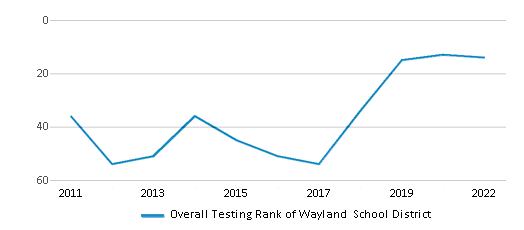
Math Test Scores (% Proficient)
75%
41%
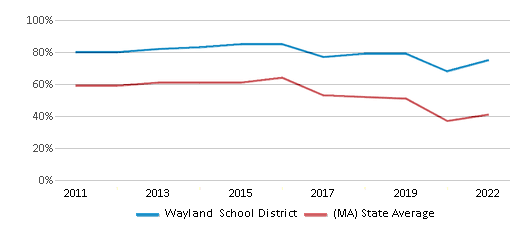
Reading/Language Arts Test Scores (% Proficient)
71%
44%
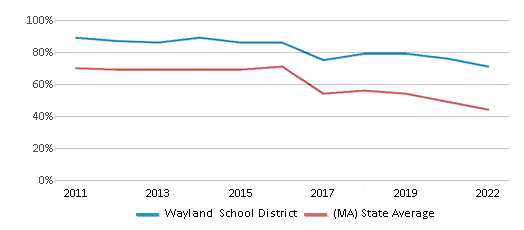
Science Test Scores (% Proficient)
75%
44%
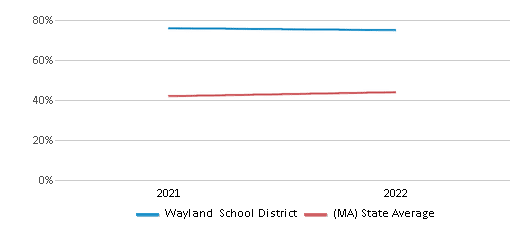
Graduation Rate
≥95%
90%
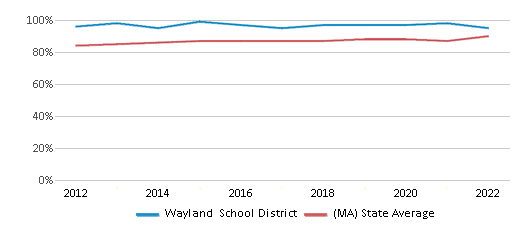
Students by Ethnicity:
Diversity Score
0.51
0.66
# American Indian Students
1 Student
846 Students
% American Indian Students
n/a
n/a
# Asian Students
414 Students
23,209 Students
% Asian Students
15%
7%
# Hispanic Students
156 Students
82,718 Students
% Hispanic Students
6%
25%
# Black Students
117 Students
37,509 Students
% Black Students
4%
12%
# White Students
1,864 Students
168,963 Students
% White Students
68%
52%
# Hawaiian Students
2 Students
298 Students
% Hawaiian Students
n/a
n/a
# Two or more races Students
190 Students
13,053 Students
% of Two or more races Students
7%
4%
Students by Grade:
# Students in PK Grade:
47
972
# Students in K Grade:
195
1,564
# Students in 1st Grade:
174
1,660
# Students in 2nd Grade:
209
1,779
# Students in 3rd Grade:
225
1,764
# Students in 4th Grade:
206
1,783
# Students in 5th Grade:
202
2,733
# Students in 6th Grade:
247
5,100
# Students in 7th Grade:
216
8,799
# Students in 8th Grade:
204
12,237
# Students in 9th Grade:
196
73,757
# Students in 10th Grade:
200
73,439
# Students in 11th Grade:
216
71,886
# Students in 12th Grade:
208
68,770
# Ungraded Students:
-
1,649
District Revenue and Spending
The revenue/student of $26,679 is higher than the state median of $23,845. The school district revenue/student has stayed relatively flat over four school years.
The school district's spending/student of $24,501 is less than the state median of $24,602. The school district spending/student has stayed relatively flat over four school years.
Total Revenue
$73 MM
$21,850 MM
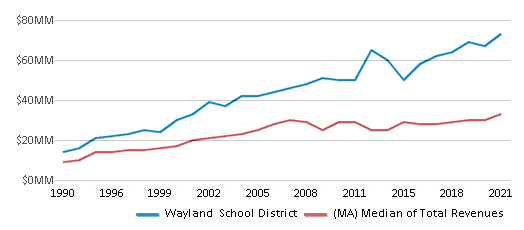
Spending
$67 MM
$22,544 MM
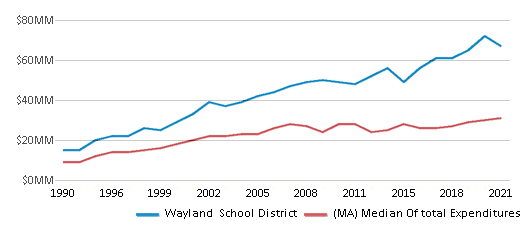
Revenue / Student
$26,679
$23,845
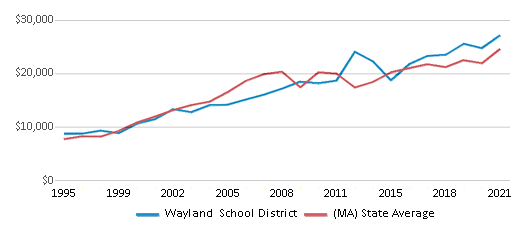
Spending / Student
$24,501
$24,602
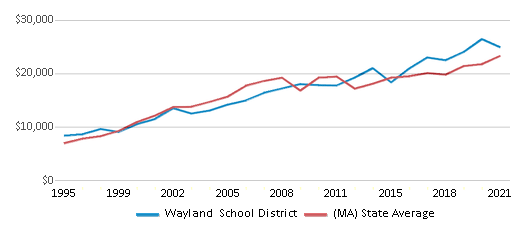
Best Wayland School District Public High Schools (2025)
School
(Math and Reading Proficiency)
(Math and Reading Proficiency)
Location
Grades
Students
Rank: #11.
Wayland High School
(Math: 83% | Reading: 84%)
Rank:
Rank:
10/
Top 1%10
264 Old Connecticut Path
Wayland, MA 01778
(508) 358-7746
Wayland, MA 01778
(508) 358-7746
Grades: 9-12
| 820 students
Recent Articles

Year-Round Or Traditional Schedule?
Which is more appropriate for your child? A year-round attendance schedule or traditional schedule? We look at the pros and cons.

Why You Should Encourage Your Child to Join a Sports Team
Participating in team sports has a great many benefits for children, there is no doubt. In this article you will learn what those benefits are.

White Students are Now the Minority in U.S. Public Schools
Increasing birth rates among immigrant families from Asia and Central and South America, combined with lower birth rates among white families, means that for the first time in history, public school students in the United States are majority-minority. This shift in demographics poses difficulties for schools as they work to accommodate children of varying language abilities and socio-economic backgrounds.





